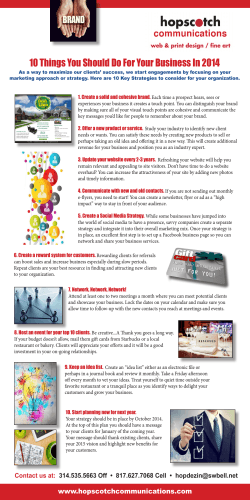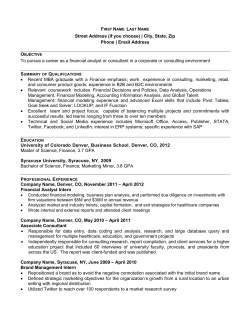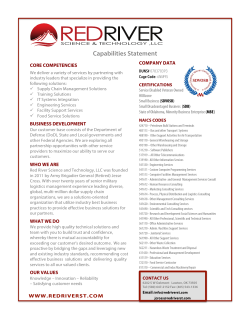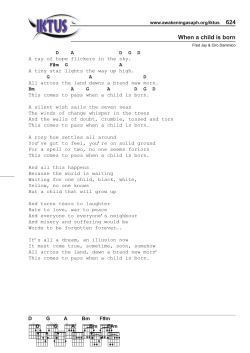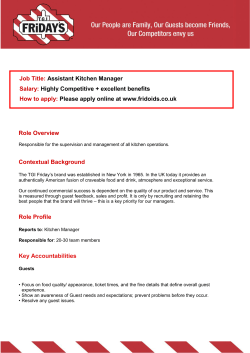
CONVERGE Talk Back Sessions September 2011 © 2009 MarketSphere Consulting, LLC
CONVERGE Talk Back Sessions September 2011 © 2009 MarketSphere Consulting, LLC Contents 1 Introduction / Key Objectives 2 Personal Brand 3 Proactive Strategic Planning - OGSM 4 Community Challenge © 2009 MarketSphere Consulting, LLC 2 Introduction / Key Objectives © 2009 MarketSphere Consulting, LLC Creating Business Harmony: Strategic advisory and technology experts to help you deliver integrated ERP, BI and EPM solutions to optimize business performance. • Our focus is on solving complex business challenges and strategic opportunities for Fortune 500 and emerging, high-growth companies • Services delivered out of eleven formal market locations throughout the United States • In 2010, engaged by more than 160 clients on over 230 projects © 2009 MarketSphere Consulting, LLC 4 St. Louis Pittsburgh Philadelphia Omaha New York Kansas City Indianapolis Houston Business Overview Dallas Chicago Atlanta About MarketSphere About MarketSphere What Makes Us Different Core Values: Excellence, Teamwork, Leadership, Community, Innovation, Diversity • About Our People • About Our Clients • About Our Community – More than 150 market-tested consultants, with 8+ years average industry experience – Strive for long-term relationship with every client, more than 75% repeat clients since inception – One of our core values; strong passion for giving back to the local communities we serve – Our Partners all come with big firm pedigrees and are active in the sales and delivery of our consulting services – Serve clients across a broad spectrum of industries from the Fortune 1000 to middle market companies – Expectation is 100% employee participation – 20% of our employees are also owners who share in business risks, decisions and rewards – Achieve significant results with our ability to work with all levels and functions within the client organization © 2009 MarketSphere Consulting, LLC – In 2010, MarketSphere and our employees supported over 100 community organizations; Financial support also provided to many organizations nation-wide 5 Our Clients Serving the World’s Top Performing Companies © 2009 MarketSphere Consulting, LLC 6 Today’s Objective Learn how principles from Nike or Ralph Lauren apply to your ministry Building a better community through your personal brand Creating a personal brand and a proactive strategic plan focusing on a particular specialty or niche in the community where you serve can make a huge impact on your church and the community at large. Principles from companies like Nike and Ralph Lauren actually apply to growing your personal development and the church as a whole. Personal Brand + Proactive Strategic Planning (OGSM) = Community Impact © 2009 MarketSphere Consulting, LLC Personal Brand © 2009 MarketSphere Consulting, LLC What is a Brand? How do characteristics of a powerful brand apply to me? A brand is the essence or promise that a product, service or company will deliver or be experienced by a buyer. A brand is an identifiable entity that makes specific promises of value. © 2009 MarketSphere Consulting, LLC Personal Branding Defined The Key to Major Community Impact We are CEOs of our own companies: Me Inc. To be in ministry today, one of our most important jobs is to be head marketer for the brand called You. It's this simple: You are a brand. You are in charge of your brand. There is no single path to success. And there is no one right way to create the brand called You. Except this: Start today. Me 2.0: Build a Powerful Brand to Achieve Career Success by Dan Schawbel (Mar 31, 2009) Be Your Own Brand: Achieve More of What You Want by Being More of Who You Are by David McNally and Karl D Speak (Jan 10, 2011) © 2009 MarketSphere Consulting, LLC Four Key Steps to Personal Branding Key Drivers That Will Shape Your Impact Discover: In order to really understand who you are investing in self-discovery is critical. In fact, if you don't spend time learning about yourself, your values, personal mission, and unique attributes, you will be at a disadvantage when marketing your brand to others. Start by asking yourself "what do I want to be known for, and then select a niche so that you can position yourself in your community. Create: Your personal branding toolkit may consist of a blog, website, business card, resume, video resume, reference document, community activities, portfolio, social network profiles, or a combination. Your brand must be consistent and reinforce each part of your toolkit. Communicate: You can communicate your brand by attending professional networking events, writing articles for magazines and media sites, commenting on blogs, connecting with people on social networks, and reaching out to the press. Maintain: As you grow, mature, and accelerate in your ministry, everything you've created has to be updated and accurately represent the current "brand you." Reference: What is your personal brand - Marla Tabaka © 2009 MarketSphere Consulting, LLC Why Should Ministers Care About Personal Branding Take control of your personal brand 1. If you don't brand yourself first, someone else will brand you. 2. Community partners want to work with strong personal brands that have successful track records. 3. Your personal brand is transferable, so if you move churches or change ministries, you don't have to start from scratch again. 4. People are searching for you or people like you online, and if you don't have a solid brand presence, you won't be taken seriously. 5. A lot of ministers, especially new ministers, have to build large networks before they generate the community impact they desire. 6. Veteran ministers can “reignite” their impact through creating a focused personal brand. Reference: What is your personal brand - Marla Tabaka © 2009 MarketSphere Consulting, LLC OGSM Overview © 2009 MarketSphere Consulting, LLC OGSM Framework OGSM Defined O S © 2009 MarketSphere Consulting, LLC OBJECTIVES Long-term, broad; usually to be accomplished over 1-3 years STRATEGIES Key priorities and actions G M GOALS Quantitative articulation of the objective METRICS Measures that tell whether strategies are delivering goals 14 OGSM Framework The Tool Objectives Goals Strategies Measures WHAT WE NEED TO ACHIEVE QUANTITATIVE ARTICULATION OF THE OBJECTIVES KEY PRIORITIES FOR HOW WE WILL ACHIEVE OUR GOALS AND OBJECTIVES NUMERICAL TARGET TELLING WHETHER STRATEGIES ARE DELIVERING GOALS WORDS NUMBERS WORDS NUMBERS What © 2009 MarketSphere Consulting, LLC How 15 Case Studies • Subsequent to acquisition, utilized OGSM Framework to define objectives, identify risks and ensure alignment across departments and with IHOP goals and expectations • Leverage Applebee’s core strength- ’market know-how’ and applied MarketSphere business and strategic planning and project management expertise to prioritize strategic initiatives and apply discipline and rigor to a new operating strategy • 100% alignment of core operating functions and new, redefined incentive structures that provides accountability across and down the organization • Challenged to change how to plan for and run the business to ensure that units are aligned against a clear set of objectives – business process vs. shelf-ware, verb vs. noun • Identified the need for a common framework to create linkage and alignment across strategic business units and functional groups • Success resulted in Hallmark using the integrated business planning framework for all business units • Facilitated development of tactical strategy • Designed and implemented award winning balanced scorecard used for the top 125 officers and board • Deployment of a Management Dashboard for financial and operational performance monitoring • Balanced Scorecard linked to incentive compensation © 2009 MarketSphere Consulting, LLC 16 OGSM Framework Linkage, Alignment & Transparency The strength of the OGSM framework and methodology comes from cascading strategies, established to meet stated goals and objectives, from the top level of the company to the objectives and goals of business units and support groups ensuring a close alignment and line of sight. Corporate Objectives, Goals and Expectations Community OGSM Objectives | Goals | Strategies | Measures Church OGSM Objectives | Goals | Strategies | Measures This linkage and transparency to company-wide objectives allows not only for business units and functional groups to be aligned with company objectives and goals, but will also allow an employee to understand how their objectives and goals are linked with the objectives and strategies of the company. © 2009 MarketSphere Consulting, LLC Support/Functional Ministries OGSM Objectives | Goals | Strategies | Measures 17 OGSM Example OBJECTIVES Radical Hospitality Passionate Worship Intentional Faith Development Risk-Taking Mission Extravagant Generosity GOALS STRATEGIES 1.) Welcome 100% of first time visitors 2.) Follow up with 100% of returning visitors (after 3rd visit) 3.) Follow up with 100% of people marking "want to join" or "prayer requests" on visitor forms 4.) 70 new members in 2008 (including confirmands) 1.) Connect with 100% of identified visitors, establish a culture of welcoming people they don't know 2.) Establish a tool and process for attendance and individual congregation details 3.) Establish a process for identification of visitors 4.) Develop/implement Visitor Follow Up Plan 5.) Develop Comprehensive Maketing Plan and Calendar 1.) Average 90 attendees at the 9:15 service (over a 3-4 week span) 2.) Technology 100% working 3.) Offer 2 additional worship opportunities 4.) Cohesive worship service 1.) Train Laity and Staff in Sound / Video 2.) Strategy for key components of worship 3.) Create functional worship committee (lay participation, diversity, cohesive worship services) 1.) Assimilate 50% of returning visitors into small groups/Sunday School 2.) 10 PersonYoung Adults (w/ kids) Sunday School class 3.) Quarterly and as required New Members and/or Methodism 101 class 4.) 60% of regular attenders participating in small groups 1.) Include small group/SS assimilation in Visitor Follow Up Plan 2.) Develop/implement Spiritual Academy by Fally 2008 3.) Develop a system for identification/ developing / training SS/Small Group class leader 4.) Children Placeholder MEASURES 1.) X number of mission opportunities 1.) Publish a quarterly "missions" journal with personal sponsored by FUMC stories 2.) 50% of worshipers engage in and 2.) Include mission participation assimilation in Visitor contribute to risk-taking mission opportunities Follow Up Plan 2.) "Feed my Sheep" Goal - recognition of 3.) Include mission testamonials in worship services food / hunger 4.) Expand visibility as a resource amongst local 4.) Mozambique Goal community agencies 5.) Feed my sheep 1.) 75% of those regularly attending worship 1.) offer financial/stewardship classes as part of Spiritual sign a pledge card Academy 2.) Increased pledge amounts in 50% of giving units 3.) Pay 100% of our apportionment 4.) Receive 100% of pledged capital campaign gifts © 2009 MarketSphere Consulting, LLC 18 Today’s Challenge Personal Brand + Proactive Strategic Planning (OGSM) = Community Impact © 2009 MarketSphere Consulting, LLC • Carl Yost, Managing Partner • [email protected] • 816.582.6202 © 2009 MarketSphere Consulting, LLC
© Copyright 2026
